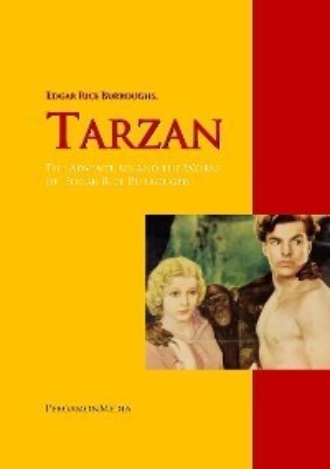
Полная версия
Tarzan: The Adventures and the Works of Edgar Rice Burroughs
Again adjusting his sights he took a long-range shot at a distant machine-gun crew to his right. With calm deliberation he wiped them out to a man. Two guns were silenced. He saw men running through the trenches and he picked off several of them. By this time the Germans were aware that something was amiss—that an uncanny sniper had discovered a point of vantage from which this sector of the trenches was plainly visible to him. At first they sought to discover his location in No Man's Land; but when an officer looking over the parapet through a periscope was struck full in the back of the head with a rifle bullet which passed through his skull and fell to the bottom of the trench they realized that it was beyond the parados rather than the parapet that they should search.
One of the soldiers picked up the bullet that had killed his officer, and then it was that real excitement prevailed in that particular bay, for the bullet was obviously of German make. Hugging the parados, messengers carried the word in both directions and presently periscopes were leveled above the parados and keen eyes were searching out the traitor. It did not take them long to locate the position of the hidden sniper and then Tarzan saw a machine gun being trained upon him. Before it had gotten into action its crew lay dead about it; but there were other men to take their places, reluctantly perhaps; but driven on by their officers they were forced to it and at the same time two other machine guns were swung around toward the ape-man and put into operation.
Realizing that the game was about up Tarzan with a farewell shot laid aside the rifle and melted into the hills behind him. For many minutes he could hear the sputter of machinegun fire concentrated upon the spot he had just quit and smiled as he contemplated the waste of German ammunition.
"They have paid heavily for Wasimbu, the Waziri, whom they crucified, and for his slain fellows," he mused; "but for Jane they can never pay—no, not if I killed them all."
After dark that night he circled the flanks of both armies and passed through the British out-guards and into the British lines. No man saw him come. No man knew that he was there.
Headquarters of the Second Rhodesians occupied a sheltered position far enough back of the lines to be comparatively safe from enemy observation. Even lights were permitted, and Colonel Capell sat before a field table, on which was spread a military map, talking with several of his officers. A large tree spread above them, a lantern sputtered dimly upon the table, while a small fire burned upon the ground close at hand. The enemy had no planes and no other observers could have seen the lights from the German lines.
The officers were discussing the advantage in numbers possessed by the enemy and the inability of the British to more than hold their present position. They could not advance. Already they had sustained severe losses in every attack and had always been driven back by overwhelming numbers. There were hidden machine guns, too, that bothered the colonel considerably. It was evidenced by the fact that he often reverted to them during the conversation.
"Something silenced them for a while this afternoon," said one of the younger officers. "I was observing at the time and I couldn't make out what the fuss was about; but they seemed to be having a devil of a time in a section of trench on their left. At one time I could have sworn they were attacked in the rear—I reported it to you at the time, sir, you'll recall—for the blighters were pepperin' away at the side of that bluff behind them. I could see the dirt fly. I don't know what it could have been."
There was a slight rustling among the branches of the tree above them and simultaneously a lithe, brown body dropped in their midst. Hands moved quickly to the butts of pistols; but otherwise there was no movement among the officers. First they looked wonderingly at the almost naked white man standing there with the firelight playing upon rounded muscles, took in the primitive attire and the equally primitive armament and then all eyes turned toward the colonel.
"Who the devil are you, sir?" snapped that officer.
"Tarzan of the Apes," replied the newcomer.
"Oh, Greystoke!" cried a major, and stepped forward with outstretched hand.
"Preswick," acknowledged Tarzan as he took the proffered hand.
"I didn't recognize you at first," apologized the major. "The last time I saw you you were in London in evening dress. Quite a difference—'pon my word, man, you'll have to admit it."
Tarzan smiled and turned toward the colonel. "I overheard your conversation," he said. "I have just come from behind the German lines. Possibly I can help you."
The colonel looked questioningly toward Major Preswick who quickly rose to the occasion and presented the ape-man to his commanding officer and fellows. Briefly Tarzan told them what it was that brought him out alone in pursuit of the Germans.
"And now you have come to join us?" asked the colonel.
Tarzan shook his head. "Not regularly," he replied. "I must fight in my own way; but I can help you. Whenever I wish I can enter the German lines."
Capell smiled and shook his head. "It's not so easy as you think," he said; "I've lost two good officers in the last week trying it—and they were experienced men; none better in the Intelligence Department."
"Is it more difficult than entering the British lines?" asked Tarzan.
The colonel was about to reply when a new thought appeared to occur to him and he looked quizzically at the ape-man. "Who brought you here?" he asked. "Who passed you through our out-guards?"
"I have just come through the German lines and yours and passed through your camp," he replied. "Send word to ascertain if anyone saw me."
"But who accompanied you?" insisted Capell.
"I came alone," replied Tarzan and then, drawing himself to his full height, "You men of civilization, when you come into the jungle, are as dead among the quick. Manu, the monkey, is a sage by comparison. I marvel that you exist at all—only your numbers, your weapons, and your power of reasoning save you. Had I a few hundred great apes with your reasoning power I could drive the Germans into the ocean as quickly as the remnant of them could reach the coast. Fortunate it is for you that the dumb brutes cannot combine. Could they, Africa would remain forever free of men. But come, can I help you? Would you like to know where several machinegun emplacements are hidden?"
The colonel assured him that they would, and a moment later Tarzan had traced upon the map the location of three that had been bothering the English. "There is a weak spot here," he said, placing a finger upon the map. "It is held by blacks; but the machine guns out in front are manned by whites. If—wait! I have a plan. You can fill that trench with your own men and enfilade the trenches to its right with their own machine guns."
Colonel Capell smiled and shook his head. "It sounds very easy," he said.
"It IS easy—for me," replied the ape-man. "I can empty that section of trench without a shot. I was raised in the jungle—I know the jungle folk—the Gomangani as well as the others. Look for me again on the second night," and he turned to leave.
"Wait," said the colonel. "I will send an officer to pass you through the lines."
Tarzan smiled and moved away. As he was leaving the little group about headquarters he passed a small figure wrapped in an officer's heavy overcoat. The collar was turned up and the visor of the military cap pulled well down over the eyes; but, as the ape-man passed, the light from the fire illuminated the features of the newcomer for an instant, revealing to Tarzan a vaguely familiar face. Some officer he had known in London, doubtless, he surmised, and went his way through the British camp and the British lines all unknown to the watchful sentinels of the out-guard.
Nearly all night he moved across Kilimanjaro's foothills, tracking by instinct an unknown way, for he guessed that what he sought would be found on some wooded slope higher up than he had come upon his other recent journeys in this, to him, little known country. Three hours before dawn his keen nostrils apprised him that somewhere in the vicinity he would find what he wanted, and so he climbed into a tall tree and settled himself for a few hours' sleep.
Chapter IV
When the Lion Fed
Kudu, the sun, was well up in the heavens when Tarzan awoke. The ape-man stretched his giant limbs, ran his fingers through his thick hair, and swung lightly down to earth. Immediately he took up the trail he had come in search of, following it by scent down into a deep ravine. Cautiously he went now, for his nose told him that the quarry was close at hand, and presently from an overhanging bough he looked down upon Horta, the boar, and many of his kinsmen. Un-slinging his bow and selecting an arrow, Tarzan fitted the shaft and, drawing it far back, took careful aim at the largest of the great pigs. In the ape-man's teeth were other arrows, and no sooner had the first one sped, than he had fitted and shot another bolt. Instantly the pigs were in turmoil, not knowing from whence the danger threatened. They stood stupidly at first and then commenced milling around until six of their number lay dead or dying about them; then with a chorus of grunts and squeals they started off at a wild run, disappearing quickly in the dense underbrush.
Tarzan then descended from the tree, dispatched those that were not already dead and proceeded to skin the carcasses. As he worked, rapidly and with great skill, he neither hummed nor whistled as does the average man of civilization. It was in numerous little ways such as these that he differed from other men, due, probably, to his early jungle training. The beasts of the jungle that he had been reared among were playful to maturity but seldom thereafter. His fellow-apes, especially the bulls, became fierce and surly as they grew older. Life was a serious matter during lean seasons—one had to fight to secure one's share of food then, and the habit once formed became lifelong. Hunting for food was the life labor of the jungle bred, and a life labor is a thing not to be approached with levity nor prosecuted lightly. So all work found Tarzan serious, though he still retained what the other beasts lost as they grew older—a sense of humor, which he gave play to when the mood suited him. It was a grim humor and sometimes ghastly; but it satisfied Tarzan.
Then, too, were one to sing and whistle while working on the ground, concentration would be impossible. Tarzan possessed the ability to concentrate each of his five senses upon its particular business. Now he worked at skinning the six pigs and his eyes and his fingers worked as though there was naught else in all the world than these six carcasses; but his ears and his nose were as busily engaged elsewhere—the former ranging the forest all about and the latter assaying each passing zephyr. It was his nose that first discovered the approach of Sabor, the lioness, when the wind shifted for a moment.
As clearly as though he had seen her with his eyes, Tarzan knew that the lioness had caught the scent of the freshly killed pigs and immediately had moved down wind in their direction. He knew from the strength of the scent spoor and the rate of the wind about how far away she was and that she was approaching from behind him. He was finishing the last pig and he did not hurry. The five pelts lay close at hand—he had been careful to keep them thus together and near him—an ample tree waved its low branches above him.
He did not even turn his head for he knew she was not yet in sight; but he bent his ears just a bit more sharply for the first sound of her nearer approach. When the final skin had been removed he rose. Now he heard Sabor in the bushes to his rear, but not yet too close. Leisurely he gathered up the six pelts and one of the carcasses, and as the lioness appeared between the boles of two trees he swung upward into the branches above him. Here he hung the hides over a limb, seated himself comfortably upon another with his back against the bole of the tree, cut a hind quarter from the carcass he had carried with him and proceeded to satisfy his hunger. Sabor slunk, growling, from the brush, cast a wary eye upward toward the ape-man and then fell upon the nearest carcass.
Tarzan looked down upon her and grinned, recalling an argument he had once had with a famous big-game hunter who had declared that the king of beasts ate only what he himself had killed. Tarzan knew better for he had seen Numa and Sabor stoop even to carrion.
Having filled his belly, the ape-man fell to work upon the hides—all large and strong. First he cut strips from them about half an inch wide. When he had sufficient number of these strips he sewed two of the hides together, afterwards piercing holes every three or four inches around the edges. Running another strip through these holes gave him a large bag with a drawstring. In similar fashion he produced four other like bags, but smaller, from the four remaining hides and had several strips left over.
All this done he threw a large, juicy fruit at Sabor, cached the remainder of the pig in a crotch of the tree and swung off toward the southwest through the middle terraces of the forest, carrying his five bags with him. Straight he went to the rim of the gulch where he had imprisoned Numa, the lion. Very stealthily he approached the edge and peered over. Numa was not in sight. Tarzan sniffed and listened. He could hear nothing, yet he knew that Numa must be within the cave. He hoped that he slept—much depended upon Numa not discovering him.
Cautiously he lowered himself over the edge of the cliff, and with utter noiselessness commenced the descent toward the bottom of the gulch. He stopped often and turned his keen eyes and ears in the direction of the cave's mouth at the far end of the gulch, some hundred feet away. As he neared the foot of the cliff his danger increased greatly. If he could reach the bottom and cover half the distance to the tree that stood in the center of the gulch he would feel comparatively safe for then, even if Numa appeared, he felt that he could beat him either to the cliff or to the tree, but to scale the first thirty feet of the cliff rapidly enough to elude the leaping beast would require a running start of at least twenty feet as there were no very good hand- or footholds close to the bottom—he had had to run up the first twenty feet like a squirrel running up a tree that other time he had beaten an infuriated Numa to it. He had no desire to attempt it again unless the conditions were equally favorable at least, for he had escaped Numa's raking talons by only a matter of inches on the former occasion.
At last he stood upon the floor of the gulch. Silent as a disembodied spirit he advanced toward the tree. He was half way there and no sign of Numa. He reached the scarred bole from which the famished lion had devoured the bark and even torn pieces of the wood itself and yet Numa had not appeared. As he drew himself up to the lower branches he commenced to wonder if Numa were in the cave after all. Could it be possible that he had forced the barrier of rocks with which Tarzan had plugged the other end of the passage where it opened into the outer world of freedom? Or was Numa dead? The ape-man doubted the verity of the latter suggestion as he had fed the lion the entire carcasses of a deer and a hyena only a few days since—he could not have starved in so short a time, while the little rivulet running across the gulch furnished him with water a-plenty.
Tarzan started to descend and investigate the cavern when it occurred to him that it would save effort were he to lure Numa out instead. Acting upon the thought he uttered a low growl. Immediately he was rewarded by the sound of a movement within the cave and an instant later a wild-eyed, haggard lion rushed forth ready to face the devil himself were he edible. When Numa saw Tarzan, fat and sleek, perched in the tree he became suddenly the embodiment of frightful rage. His eyes and his nose told him that this was the creature responsible for his predicament and also that this creature was good to eat. Frantically the lion sought to scramble up the bole of the tree. Twice he leaped high enough to catch the lowest branches with his paws, but both times he fell backward to the earth. Each time he became more furious. His growls and roars were incessant and horrible and all the time Tarzan sat grinning down upon him, taunting him in jungle billingsgate for his inability to reach him and mentally exulting that always Numa was wasting his already waning strength.
Finally the ape-man rose and un-slung his rope. He arranged the coils carefully in his left hand and the noose in his right, and then he took a position with each foot on one of two branches that lay in about the same horizontal plane and with his back pressed firmly against the stem of the tree. There he stood hurling insults at Numa until the beast was again goaded into leaping upward at him, and as Numa rose the noose dropped quickly over his head and about his neck. A quick movement of Tarzan's rope hand tightened the coil and when Numa slipped backward to the ground only his hind feet touched, for the ape-man held him swinging by the neck.
Moving slowly outward upon the two branches Tarzan swung Numa out so that he could not reach the bole of the tree with his raking talons, then he made the rope fast after drawing the lion clear of the ground, dropped his five pigskin sacks to earth and leaped down himself. Numa was striking frantically at the grass rope with his fore claws. At any moment he might sever it and Tarzan must, therefore, work rapidly.
First he drew the larger bag over Numa's head and secured it about his neck with the draw string, then he managed, after considerable effort, during which he barely escaped being torn to ribbons by the mighty talons, to hog-tie Numa—drawing his four legs together and securing them in that position with the strips trimmed from the pigskins.
By this time the lion's efforts had almost ceased—it was evident that he was being rapidly strangled and as that did not at all suit the purpose of the Tarmangani the latter swung again into the tree, unfastened the rope from above and lowered the lion to the ground where he immediately followed it and loosed the noose about Numa's neck. Then he drew his hunting knife and cut two round holes in the front of the head bag opposite the lion's eyes for the double purpose of permitting him to see and giving him sufficient air to breathe.
This done Tarzan busied himself fitting the other bags, one over each of Numa's formidably armed paws. Those on the hind feet he secured not only by tightening the draw strings but also rigged garters that fastened tightly around the legs above the hocks. He secured the front-feet bags in place similarly above the great knees. Now, indeed, was Numa, the lion, reduced to the harmlessness of Bara, the deer.
By now Numa was showing signs of returning life. He gasped for breath and struggled; but the strips of pigskin that held his four legs together were numerous and tough. Tarzan watched and was sure that they would hold, yet Numa is mightily muscled and there was the chance, always, that he might struggle free of his bonds after which all would depend upon the efficacy of Tarzan's bags and draw strings.
After Numa had again breathed normally and was able to roar out his protests and his rage, his struggles increased to Titanic proportions for a short time; but as a lion's powers of endurance are in no way proportionate to his size and strength he soon tired and lay quietly. Amid renewed growling and another futile attempt to free himself, Numa was finally forced to submit to the further indignity of having a rope secured about his neck; but this time it was no noose that might tighten and strangle him; but a bowline knot, which does not tighten or slip under strain.
The other end of the rope Tarzan fastened to the stem of the tree, then he quickly cut the bonds securing Numa's legs and leaped aside as the beast sprang to his feet. For a moment the lion stood with legs far outspread, then he raised first one paw and then another, shaking them energetically in an effort to dislodge the strange footgear that Tarzan had fastened upon them. Finally he began to paw at the bag upon his head. The ape-man, standing with ready spear, watched Numa's efforts intently. Would the bags hold? He sincerely hoped so. Or would all his labor prove fruitless?
As the clinging things upon his feet and face resisted his every effort to dislodge them, Numa became frantic. He rolled upon the ground, fighting, biting, scratching, and roaring; he leaped to his feet and sprang into the air; he charged Tarzan, only to be brought to a sudden stop as the rope securing him to the tree tautened. Then Tarzan stepped in and rapped him smartly on the head with the shaft of his spear. Numa reared upon his hind feet and struck at the ape-man and in return received a cuff on one ear that sent him reeling sideways. When he returned to the attack he was again sent sprawling. After the fourth effort it appeared to dawn upon the king of beasts that he had met his master, his head and tail dropped and when Tarzan advanced upon him he backed away, though still growling.
Leaving Numa tied to the tree Tarzan entered the tunnel and removed the barricade from the opposite end, after which he returned to the gulch and strode straight for the tree. Numa lay in his path and as Tarzan approached growled menacingly. The ape-man cuffed him aside and unfastened the rope from the tree. Then ensued a half-hour of stubbornly fought battle while Tarzan endeavored to drive Numa through the tunnel ahead of him and Numa persistently refused to be driven. At last, however, by dint of the unrestricted use of his spear point, the ape-man succeeded in forcing the lion to move ahead of him and eventually guided him into the passageway. Once inside, the problem became simpler since Tarzan followed closely in the rear with his sharp spear point, an unremitting incentive to forward movement on the part of the lion. If Numa hesitated he was prodded. If he backed up the result was extremely painful and so, being a wise lion who was learning rapidly, he decided to keep on going and at the end of the tunnel, emerging into the outer world, he sensed freedom, raised his head and tail and started off at a run.
Tarzan, still on his hands and knees just inside the entrance, was taken unaware with the result that he was sprawled forward upon his face and dragged a hundred yards across the rocky ground before Numa was brought to a stand. It was a scratched and angry Tarzan who scrambled to his feet. At first he was tempted to chastise Numa; but, as the ape-man seldom permitted his temper to guide him in any direction not countenanced by reason, he quickly abandoned the idea.
Having taught Numa the rudiments of being driven, he now urged him forward and there commenced as strange a journey as the unrecorded history of the jungle contains. The balance of that day was eventful both for Tarzan and for Numa. From open rebellion at first the lion passed through stages of stubborn resistance and grudging obedience to final surrender. He was a very tired, hungry, and thirsty lion when night overtook them; but there was to be no food for him that day or the next—Tarzan did not dare risk removing the head bag, though he did cut another hole which permitted Numa to quench his thirst shortly after dark. Then he tied him to a tree, sought food for himself, and stretched out among the branches above his captive for a few hours' sleep.
Early the following morning they resumed their journey, winding over the low foothills south of Kilimanjaro, toward the east. The beasts of the jungle who saw them took one look and fled. The scent spoor of Numa, alone, might have been enough to have provoked flight in many of the lesser animals, but the sight of this strange apparition that smelled like a lion, but looked like nothing they ever had seen before, being led through the jungles by a giant Tarmangani was too much for even the more formidable denizens of the wild.
Sabor, the lioness, recognizing from a distance the scent of her lord and master intermingled with that of a Tarmangani and the hide of Horta, the boar, trotted through the aisles of the forest to investigate. Tarzan and Numa heard her coming, for she voiced a plaintive and questioning whine as the baffling mixture of odors aroused her curiosity and her fears, for lions, however terrible they may appear, are often timid animals and Sabor, being of the gentler sex, was, naturally, habitually inquisitive as well.






